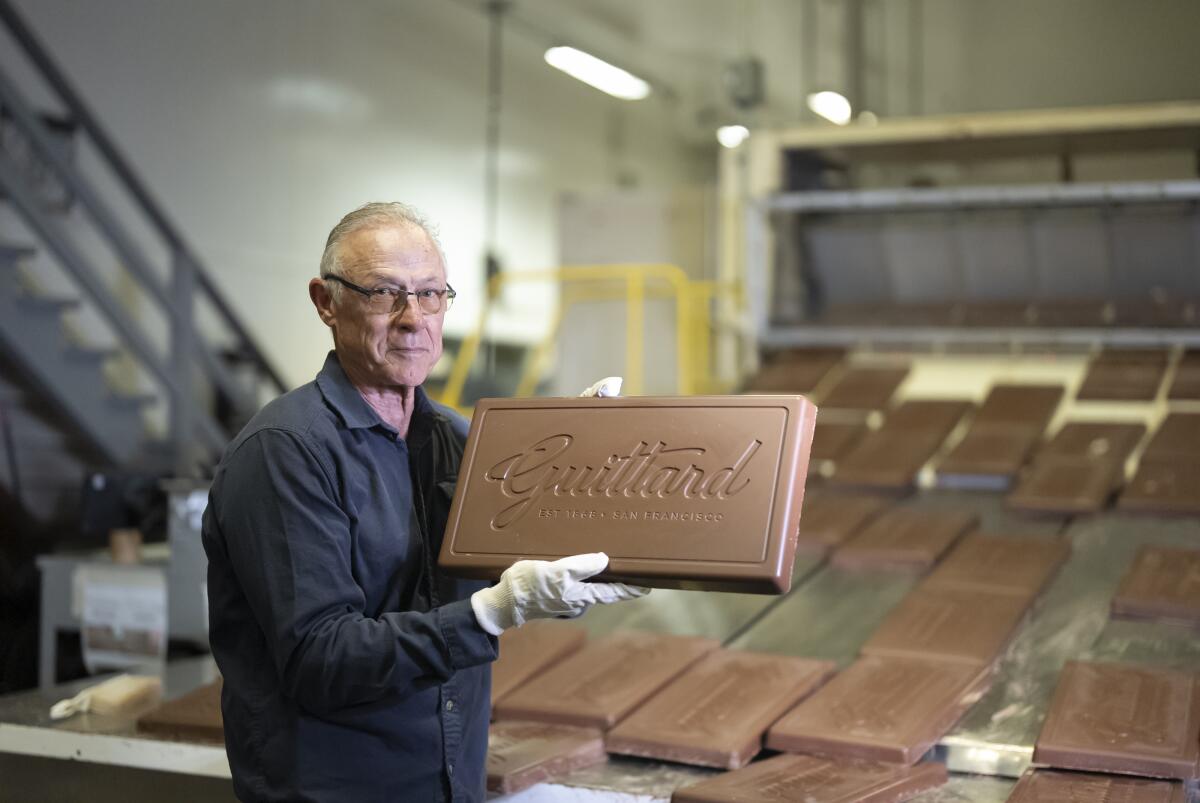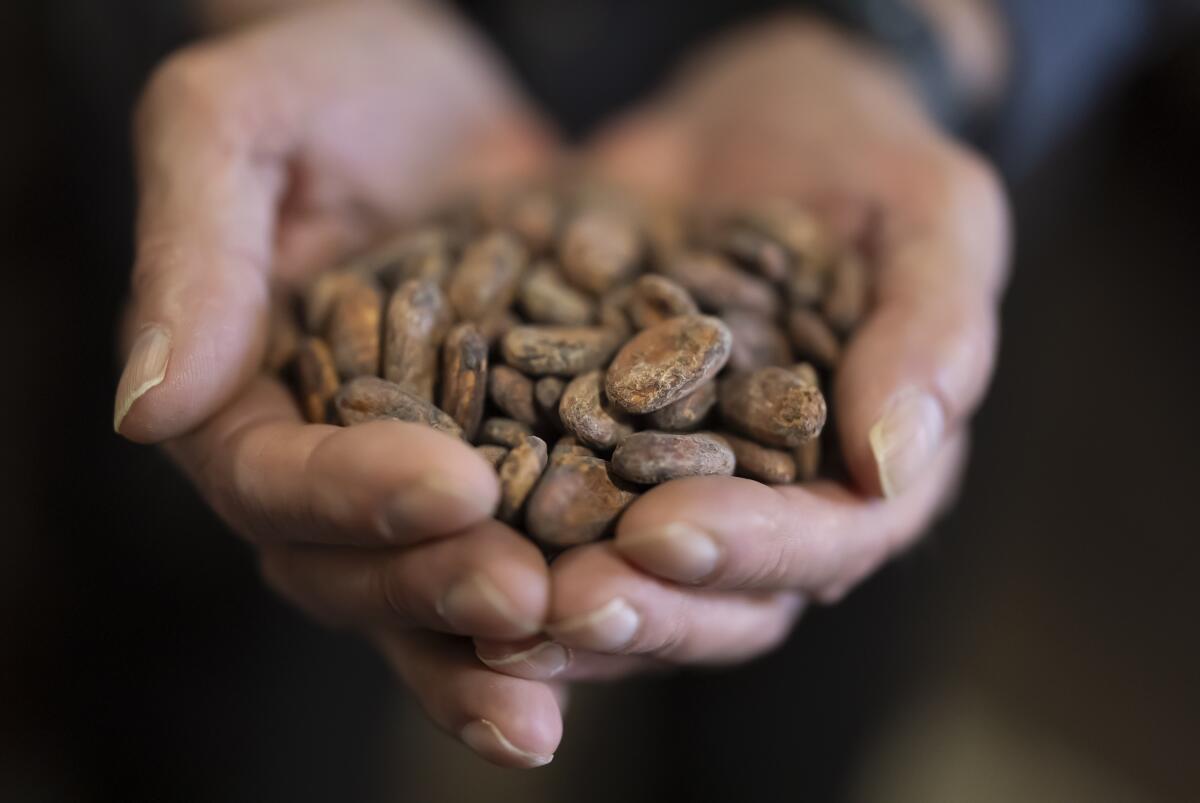Tariffs give 157-year-old chocolate maker Guittard a bitter taste

- Share via
During the Gold Rush of the mid-1850s, Etienne Guittard, a French chocolatier, sailed to California like many others, hoping to strike it rich.
However, he soon realized his fortunes lay not in the mines but in selling the chocolates he brought with him from his uncle’s Tournus factory to trade for mining supplies.
Trump’s worldwide tariffs are putting the squeeze on several high-profile L.A.-based toy makers and apparel companies.
In 1868, after a stint refining his skills back in France, he returned and started a small business, E. Guittard & Co., on San Francisco’s waterfront. In addition to making chocolate, he sold tea, coffee and spices.
The business became a fixture in the city as it grew into one of the country’s major metropolitan centers. Guittard became the chocolate maker of choice for top chefs like Thomas Keller and restaurants such as Chez Panisse, and supplier to iconic confectioner See’s Candies since the 1930s.
Over the last century, the family-owned business has survived numerous threats to its existence, including the 1906 San Francisco earthquake, the Great Depression, massive sugar price hikes in the 1970s and the unexpected deaths of the company’s president and successor in the late 1980s, not to mention competition from artisanal brands in the 2000s.
Now it is facing yet another crisis: the Trump administration’s global tariff war.
“It was like a jab after a good hard right,” said Gary Guittard, the fourth-generation president and chief executive of Guittard Chocolate Co.
Guittard had just absorbed the shock of last year’s 180% spike in cocoa prices (on top of the 61% increase the year before), the result of shortages because of climate impacts and drought, when President Trump announced in April that he was implementing global tariffs that would include cocoa beans, chocolate’s key ingredient.
While businesses from autos to toys are grappling with the effects of new global tariffs, the imposition of retaliatory levies on imports has injected new turmoil into the already turbulent chocolate market. For a small, slim-margin business like Guittard, tariffs have the potential to wreak havoc, as prices are expected to rise even more, creating fresh uncertainties for manufacturers that depend on materials from abroad.
Business owners across Los Angeles who rely on imported goods are bracing for higher prices as Trump imposes steep taxes on products from several countries.
“I didn’t understand the numbers until I started playing the numbers,” he said. With the price of cocoa beans nearly quadrupling in the last two years to $12,931 per metric ton from $3,261 in 2023, Guittard said he was now having to look at adding another 10% into the cost of doing business.
“I immediately thought, we have to raise our prices,” he said.
While other manufacturers may turn to alternatives to help soften the tariff blow, American chocolate makers are wholly reliant on imports. Cocoa beans, the raw unprocessed ingredient used to make chocolate, can only grow in tropical regions that are 20 degrees north and south of the equator.
The majority is produced in the West African nations of Ivory Coast and Ghana; it is also grown in parts of Central South America and Southeast Asia.
“We are really having a lot of discussions on how we want to approach the tariffs and whether we can afford to mitigate the effect on our customers by absorbing some of the effects on cost. But that, of course, will affect our bottom line as well,” he said.
The company, now based in Burlingame, Calif., south of San Francisco, sources beans from multiple locations including Ghana, Ivory Coast and South America. The blends have given Guittard chocolate unique flavor profiles, but have also served as a hedge against the vagaries of the market.
“We have a blend of beans, purely and precisely because of these kinds of events: political events or diseases or anything that can happen,” Guittard said.

Trump’s tariffs have injected a new and complex variable into that calculation. While America’s trading partners were given a minimum baseline 10% duty, a number of the cocoa-producing nations, where Guittard purchases its beans, were slapped with higher tariffs. For instance, the Ivory Coast was given 21% and Madagascar a 45% duty.
“I think mathematically you can figure that out,” said Guittard, but noted that the picture becomes increasingly complicated when you try to determine prices when a particular product uses bean blends that have different tariffs. For instance, the company’s inventory currently has pre-tariffed beans and is expecting shipments to come in from South America that will be tariffed.
“There’s 10 different ways to look at it. So we’re just trying to figure out what’s the best way for us and our customers.”
Guittard says the company is leaning toward absorbing a portion of the cost. “We have to decide how much we can absorb and for how long. We certainly can’t absorb it all. We’re a small family company, not a large multinational conglomerate.”
Guittard, which employs about 240 people, is a small player in the nearly $30-billion U.S.-based chocolate market, generating roughly $100 million annually. The company did not disclose earnings but says it’s profitable.
Unlike the major U.S. manufacturers such as Hershey and Mars, Guittard, like most small businesses, doesn’t have the kind of resources or influence to get a carve out or cushion the coming financial blow.
Chocolate giant Hershey, which earned $11.2 billion in revenue last year, is seeking an exemption from the federal government to help blunt an estimated $20 million in tariff expenses this quarter.
The company’s chief financial officer, Steve Voskuil, said that it was “using every lever at our disposal to get those tariffs changed.”
Swiss chocolate conglomerate Lindt & Sprüngli, which acquired Ghirardelli in 1998, announced that it will sidestep the U.S. as a supplier in order to avoid tariffs.
“We are monitoring the situation very closely and have identified different ways to mitigate the effect of tariffs,” a Lindt spokesperson told Fox News Digital. “These include the possibility of supplying countries like Canada and Mexico from our European production facilities.”
The National Confectioners Assn., an advocacy trade organization for candy makers, is also seeing how to navigate the situation on behalf of its members. “We’re watching this closely,” said Christopher Gindlesperger, the NCA’s senior vice president of public affairs and communications.
“We’re trying to look at it through our customer’s eyes. We don’t want it to affect them,” said Guittard. “A lot of our customers are family businesses as well.”

For now, Guittard says he will have to play the waiting game and see how it unfolds. A key factor, he says, is how consumers react and whether they will limit or stop buying candy bars and baking chocolate.
“This is a lot more complicated to implement than meets the eye, and we want to be transparent and honest about how we do it rather than using [tariffs] as an excuse to raise prices, which is not what I want to do,” he said.
More to Read
Inside the business of entertainment
The Wide Shot brings you news, analysis and insights on everything from streaming wars to production — and what it all means for the future.
You may occasionally receive promotional content from the Los Angeles Times.












